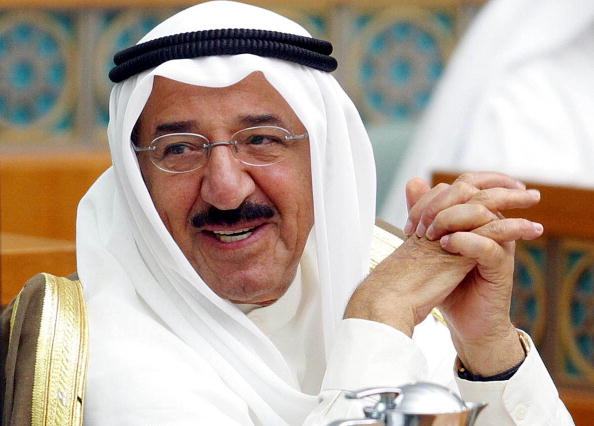Sheikh Sabah Al-Ahmad Al-Jaber Al-Sabah at a Glance
- Categories: Politicians, Politicians > Sheiks
- Net Worth: $600 Million
- Birthdate: Jun 16, 1929 - Sep 29, 2020 (91 years old)
- Birthplace: Kuwait City
- Gender: Male
- Profession: Politician
- Nationality: Kuwait
The Life and Legacy of Sheikh Sabah Al-Ahmad Al-Jaber Al-Sabah: A Detailed Look
Introduction: The Emir of Kuwait
Sheikh Sabah Al-Ahmad Al-Jaber Al-Sabah, who served as the Emir of Kuwait from 2006 until his death in 2020, left an indelible mark on Kuwait and the international stage. Known for his diplomatic skills, humanitarian efforts, and leadership during a period of regional instability, Sheikh Sabah’s life and reign are subjects of significant interest. This article delves into the life of Sheikh Sabah, exploring his early life, career in government, his role as Emir, humanitarian contributions, controversies, and lasting legacy.
Early Life and Education
Born on June 16, 1929, in Al Jahra, Kuwait, Sheikh Sabah was the fourth son of Sheikh Ahmad Al-Jaber Al-Sabah, the then-ruler of Kuwait, and Munira Othman Hamad Al-Ayyar Al-Saeed. His upbringing was rooted in the traditions of the Al-Sabah dynasty, which has ruled Kuwait since the 18th century. He received his primary education at Al Mubarakya School, a significant institution in Kuwait’s early educational system, and later continued his studies under private tutors, a common practice for members of the ruling family. This early education provided the foundation for his future role in leadership, instilling values of diplomacy, governance, and an understanding of Kuwait’s history and cultural heritage.
A Career in Government
Sheikh Sabah’s career in government began in 1954, demonstrating an early commitment to public service. His rise through the ranks was marked by strategic appointments and a deep understanding of Kuwait’s political landscape. He served as Foreign Minister of Kuwait from 1963 to 2003, a remarkable tenure that made him the world’s longest-serving Foreign Minister at the time of his departure. During his long tenure, he played a pivotal role in shaping Kuwait’s foreign policy. He skillfully navigated complex regional and international relationships. His diplomatic efforts were crucial in Kuwait’s development and its position on the global stage. He also served as Deputy Prime Minister and briefly as the acting Minister of Finance, showcasing his versatility and understanding of various aspects of governance.
Emir of Kuwait: Leadership and Challenges
Sheikh Sabah became the Emir of Kuwait on January 29, 2006, following a period of political transition. His ascension to the throne was a moment of both continuity and change. His leadership was tested by internal political struggles and regional challenges. A key event during his reign was the dissolution of the National Assembly in 2008 amidst governmental power struggles, and again in 2012, which reflected the complexities of managing Kuwait’s political landscape. His leadership style was characterized by a focus on consensus-building and mediation. He served as a key mediator in the Qatar diplomatic crisis of 2017, and he fostered Kuwait’s role as a bridge-builder in the region, promoting dialogue and understanding among often-conflicting parties. His approach was crucial in maintaining Kuwait’s stability and promoting regional peace.

YASSER AL-ZAYYAT/AFP/Getty Images
Humanitarian Efforts and International Recognition
Sheikh Sabah was widely recognized for his commitment to humanitarian causes, earning him the nickname “the Humanitarian Leader.” He directed significant resources towards aiding Syrian refugees, supporting disaster relief efforts worldwide, and promoting public health initiatives globally. His contributions earned him the United Nations’ Humanitarian Leader award in 2014, presented by then-Secretary-General Ban Ki-moon. Former US President Jimmy Carter also praised his work, referring to him as a “global humanitarian leader.” These accolades underscored his dedication to improving the lives of people affected by conflict, natural disasters, and poverty, solidifying his reputation as a compassionate and influential figure on the world stage.
Controversies: Jailing of Critics
Despite his humanitarian efforts, Sheikh Sabah’s reign was not without controversy. Criticism arose over the jailing of critics, including protestors, journalists, and even members of parliament. Notable cases include the imprisonment of Ayad Al-Hirbi in 2013 for tweets critical of the government, and the sentencing of former MPs for allegedly insulting the Emir. These actions led to concerns regarding freedom of expression and human rights in Kuwait. The jailing of opposition figures and those who voiced dissenting opinions was a contentious issue, raising questions about the balance between national security and individual liberties. These actions were often defended by the government as necessary to maintain stability, but they drew considerable criticism from international human rights organizations.
Personal Life and Death
Sheikh Sabah’s personal life included his marriage to Sheikha Fatuwah Salman Al-Sabah, who passed away in 1990. They had four children: Sheikhs Nasser, Hamad, and Ahmed, and Sheikha Salwa. After a long period of declining health, including a stroke in 2019, Sheikh Sabah died on September 29, 2020, at the age of 91. His death marked the end of an era for Kuwait. He was buried at Sulaibikhat Cemetery alongside his family. His half-brother, Sheikh Nawaf al-Ahmad al-Jaber al-Sabah, succeeded him as the new Emir of Kuwait, continuing the Al-Sabah dynasty’s rule.
Legacy: Sheikh Sabah’s Impact
Sheikh Sabah Al-Ahmad Al-Jaber Al-Sabah’s legacy is multifaceted. He is remembered for his diplomatic skills, particularly in navigating complex regional dynamics. His leadership during the Qatar diplomatic crisis showcased his ability to mediate and foster dialogue. His humanitarian efforts earned him widespread respect and recognition, while his handling of domestic political issues, particularly the jailing of critics, drew criticism. Despite the controversies, his impact on Kuwait’s foreign policy and his commitment to humanitarian causes remain significant aspects of his legacy. Sheikh Sabah’s reign saw Kuwait navigate significant challenges and solidify its role as a key player in the Gulf region and beyond. His influence continues to shape Kuwait’s identity and its position in the international community.
/**/

